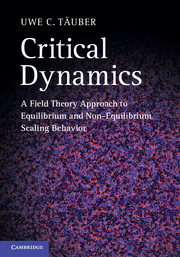Part II - Scale invariance in non-equilibrium systems
Published online by Cambridge University Press: 05 June 2014
Summary
In the second part of this book, we consider the dynamics of systems far away from thermal equilibrium. This departure from equilibrium may be caused by an external driving force, as is the case for driven diffusive systems or growing interfaces considered in Chapter 11; there also exist fundamentally open athermal systems which never reach equilibrium, as is true for some of the reaction-diffusion systems considered in Chapter 9. In both instances, the constraints imposed by detailed balance and the ensuing fluctuation-dissipation theorem on the form of phenomenological equations describing the temporal evolution of such systems are absent. Even at the fundamental level of quantum mechanics, the dynamical description of such open dissipative systems is still quite poorly understood. Generally, it may thus seem a hopeless task to derive coarse-grained equations of motion for only a few mesoscopic degrees of freedom from such an unsatisfactory foundation.
Fortunately, this conclusion is too pessimistic, at least if we are interested in systems whose non-equilibrium steady state is tuned close to a critical point, or displays generic scale invariance. For, in these situations, we may appeal to the concept of universality to allow us to constrain through basic symmetry and conservation arguments the terms which must be retained in an effective dynamical description. Similarly, we may hope that the universal properties of drastically simplified models which happen to be exactly solvable may extend to more realistic and technologically relevant systems.
- Type
- Chapter
- Information
- Critical DynamicsA Field Theory Approach to Equilibrium and Non-Equilibrium Scaling Behavior, pp. 305 - 308Publisher: Cambridge University PressPrint publication year: 2014

